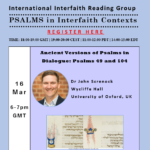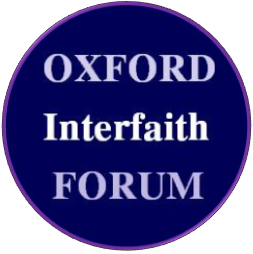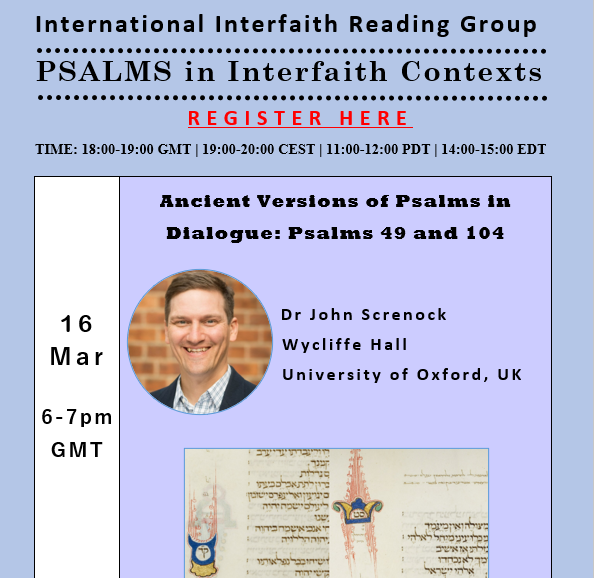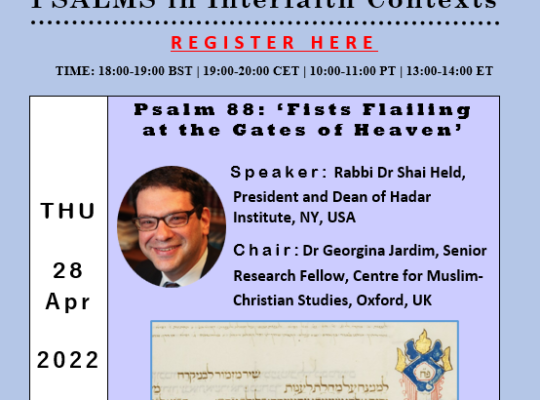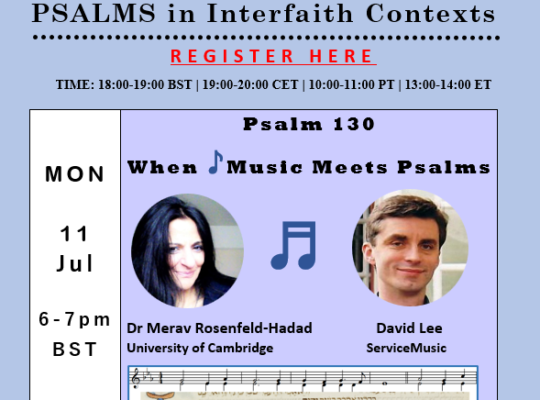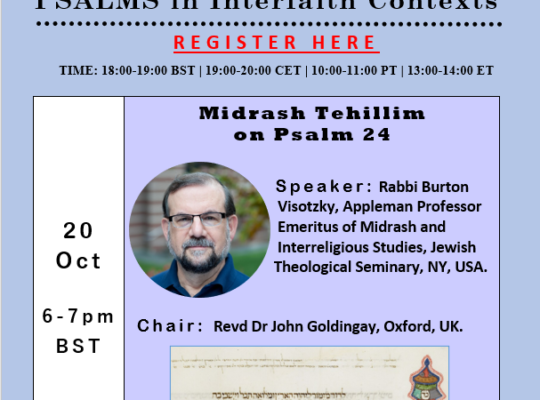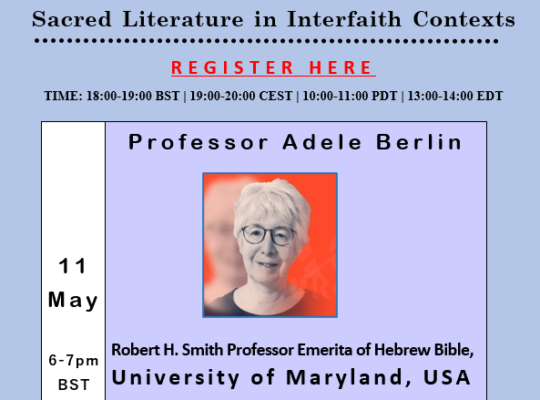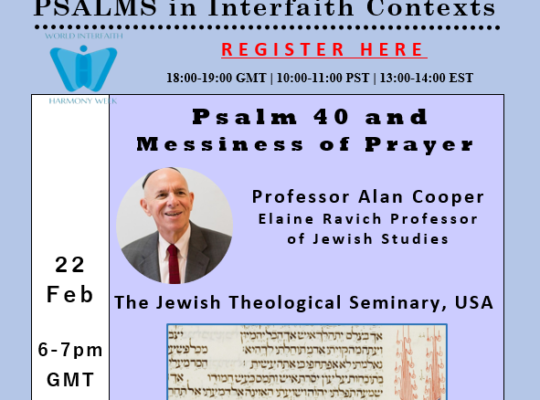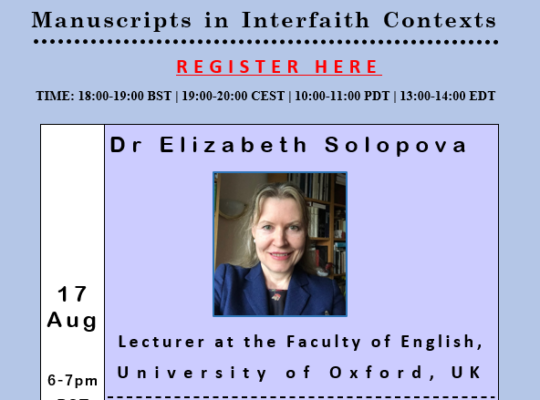16 March, 2023
We are deeply honoured to welcome Dr John Screnock, Tutor in Old Testament at Wycliffe Hall, University of Oxford, and Research Fellow at the Oxford Centre for Hebrew and Jewish Studies, to lead a session of the Psalms in Interfaith Contexts Reading Group.
Here are the details of this fascinating session.
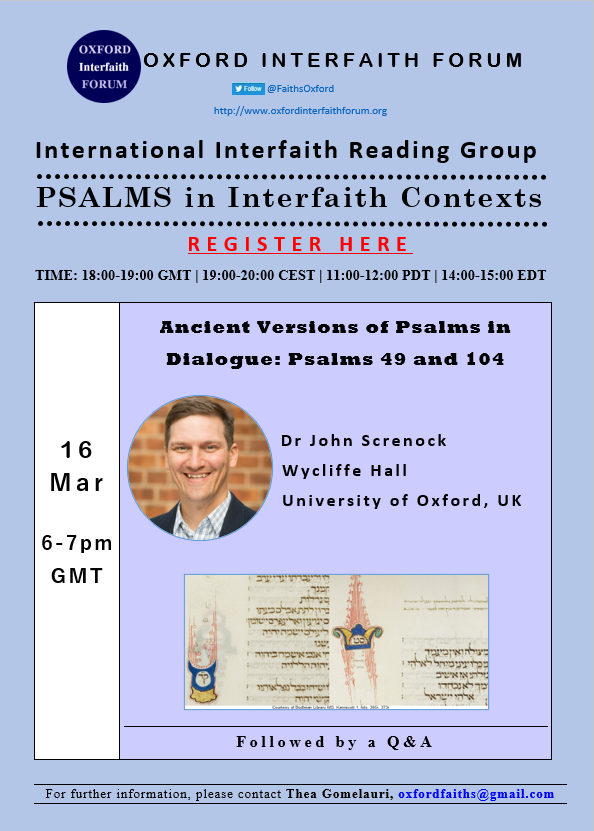
Topic: Ancient Versions of Psalms in Dialogue: Psalms 49 and 104
Abstract: The “text” of Psalms—the specific Hebrew words written in manuscripts—is fairly uniform in our earliest evidence (from the late Second Temple period). However, even minute differences can have a major impact on the interpretation of a psalm, the understanding of its poetics, and the construction of its conceptual world. Psalms 49 and 104 present two examples. In Psalm 49, one version of the text presents us with a powerful refrain on the lack of wisdom amongst the wealthy and powerful. The other version presents us with a textual error and a somewhat garbled text—or is it a clever turn of phrase that makes a surprising point? In Psalm 104, one version of the text catalogues God’s mighty acts of creation in the past, then turns to God’s benevolence toward his creation in the present. The other version leaves the timing of some acts of creation tantalizingly open: the reader is prompted to consider whether God created only in the past, or also in the present. Moreover, the causational relationship between God and creation is highlighted through tightly knit poetic lines. In addition to these two versions of Psalm 104, the move from one to the other in an act of revision reveals two views of creation—one that insists that God created only in the past, and another that believes creation still occurs in the present.
Speaker: Dr John Screnock, Tutor in Old Testament at Wycliffe Hall, University of Oxford, and Research Fellow at the Oxford Centre for Hebrew and Jewish Studies, UK.
Speaker’s biography: Dr John Screnock (PhD, Toronto) is Tutor in Old Testament at Wycliffe Hall (since 2021), and Research Fellow at the Oxford Centre for Hebrew and Jewish Studies (since 2016). From 2018–2021 he was Research Fellow in Hebrew Bible at Oxford, and from 2015–2018 he was Kennicott Fellow in Hebrew at Oxford. His research interests include the Hebrew Bible, the Psalms, Dead Sea scrolls, Hebrew linguistics, and textual criticism. He is the author of Traductor Scriptor: The Old Greek Translation of Exodus 1–14 as Scribal Activity (Brill 2017), A Grammar of Ugaritic (SBL, 2022), and articles in Journal of Biblical Literature, Vetus Testamentum, Biblica, Journal of Semitic Studies, Hebrew Studies, Textus, Revue de Qumran, and Dead Sea Discoveries. John’s current project, Reading Psalms in the School of the Scribes (OUP), examines scribal activity in the textual witnesses to Psalms for insights into the language, poetics, and interpretation of the Psalms.
Chair: Revd Dr Michael Lloyd, Principal of Wycliffe Hall, University of Oxford, UK.
Opening/Closing Statements: Dr Yashua Bhatti, Visiting Researcher at the Faculty of Theology and Religion, University of Oxford, and Fellow of the Oxford Interfaith Forum, UK.
Date: 16 March, 2023
Time: 18:00-19:00 GMT | 19:00-20:00 CEST | 11:00-12:00 PDT | 14:00-15:00 EDT
Venue: online
After registering, you will receive email from ZOOM containing information about joining the meeting. If you do not see a Zoom email in your inbox, please, check your spam folder.
If you would like to join the Psalms in Interfaith Contexts Reading Group, please sign up here.
Related Sessions
- Psalmody as an Alternative to Theodicy
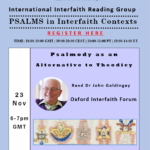
- Beyond Exegesis: The Psalm Cultures of Ancient Jews and Early Christians
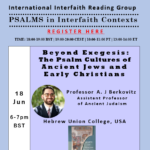
- Psalm 40 and Messiness of Prayer
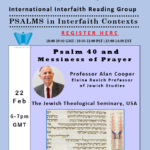
- Psalm 109: The Prayer No One Wants
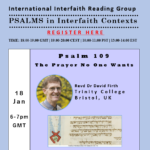
- A Book for All Seasons: Medieval Liturgical Psalter
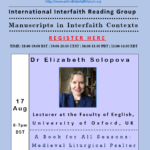
- Exile and Restoration in the Psalms
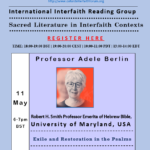
- Psalm 37:25, Innocent Suffering, and Divine Recompense
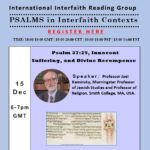
- Psalm 44 and the Book of Job: God on Trial
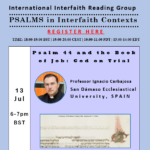
- Psalm 132: A Song of Ascents
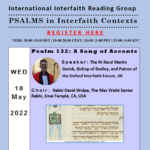
- Psalm 88: ‘Fists Flailing at the Gates of Heaven’
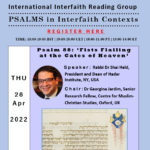
- Psalm 82: Demanding Justice
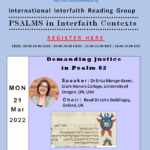
- Surprising Uplift of Psalm 23
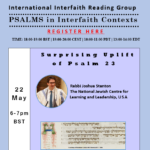
- ‘Deep cries unto deep’: Julian of Norwich and Psalm 42
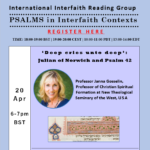
- Psalm 51: Contemporary Multifaith Interpretations
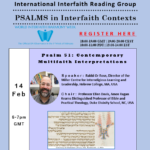
- Comparative Reading of Psalms and Abrahams’ Prayers in the Quran
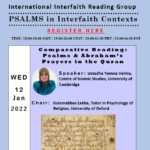
- Psalm 33: Mystical Reading
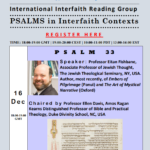
- Psalm 139
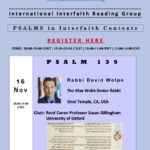
- Psalm 1: Inaugural Session by Revd Dr John Goldingay
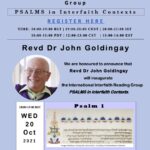
- Psalm 131: How I Weaned Myself from the Breast of God
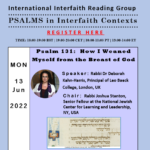
- When Music Meets Psalms: Psalm 130
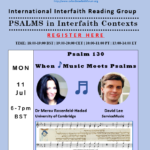
- Psalm 46: Singing in Hope and Defiance
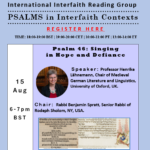
- Psalm 19: Muslim Reflections on Creation
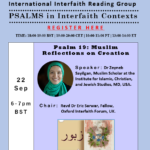
- Psalm 106: Fall of Jerusalem and Lamentations Ch.3
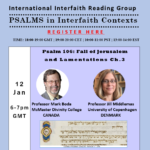
- Midrash Tehillim on Psalm 24
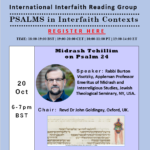
- Spurring Colonialism and Slavery: Protestants and Catholics United in their Use of Psalm 132
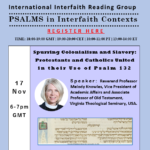
- Awake, My Soul! Psalms: 44; 57; 133; 143
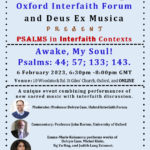
- The Art of Sacred Sound in the Muslim Context: Psalms and Islam
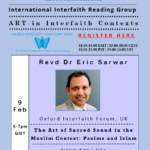
- Music, Poetry, and Psalm 131 in Christian Liturgy
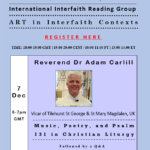
- Ancient Versions of Psalms in Dialogue: Psalms 49 and 104
